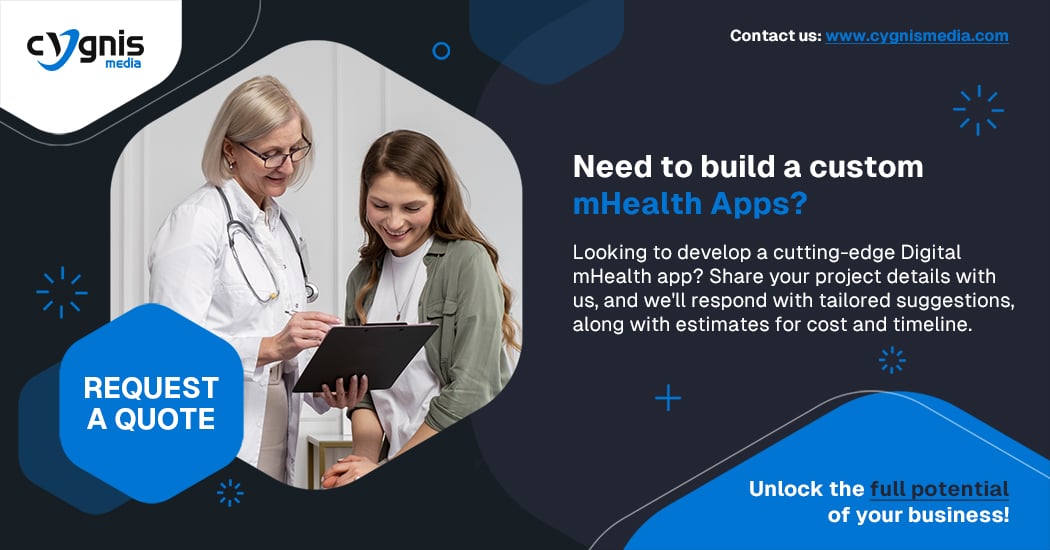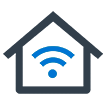The clinical decision support system plays a pivotal role in the healthcare realm, assisting medical professionals in making informed decisions. These systems offer deep insights and evidence-based recommendations by analyzing patient data and information to improve diagnosis accuracy and treatment outcomes. Whether clinicians need to analyze information regarding patient treatment plans, medication, diagnosis, or resource management, a clinical decision support system acts as a valuable assistance for healthcare professionals.
However, these systems integrated into mHealth apps emerge as a significant tool for doctors and medical practitioners who leverage mobile devices for quick and efficient healthcare decision-making. This blog post delves into the exploration of the role of mHealth apps in clinical decision support systems for improved decision-making and enhanced patient care. Let’s begin with a quick overview of what clinical decision support is:
What is a Clinical Decision Support System
A clinical decision support system is a software tool that analyzes patient data, medical history, lab test results, and symptoms to offer guidance and support to clinicians in making smart decisions. If a doctor needs to make a decision regarding their patient's condition, the mHealth app collects and analyzes patient data to offer diagnostic, therapeutic, and preventive insights leveraging advanced machine learning techniques. The mHealth app delivers personalized recommendations tailored to individual patient needs based on the data generated by the clinical decision support system. Moreover, mHealth apps analyze early symptoms and potential healthcare risks to assist clinicians in providing accurate and timely preventive care to patients.
Why Healthcare Professionals Leverage mHealth Apps for Clinical Decision Support Systems
mHealthcare app in clinical decision-making is designed for mobile devices, such as smartphones or tablets to support healthcare delivery and health-related services. There are many reasons why healthcare professionals leverage mhealth apps for clinical decision-making. Let’s dive into exploring them:
- Accessibility: mHealth apps provide healthcare professionals with immediate access to clinical decision support tools on their mobile devices. They can make informed decisions at the point of care without the need to access bulky equipment.
- Convenience: mHealth apps are convenient for healthcare professionals who need quick access to patient data, test results, or medical records regardless of their location. They can monitor and track their patient health from anywhere and provide necessary prescriptions as needed.
- Real-time Data Access: Clinicians gain immediate insight into patient data and analytics to predict potential healthcare risks and symptoms and utilize this data for proactive preventive care. AI-based data and predictive analytics integrated into mHealth apps lead to data-driven decision-making.
- Customization: Many mHealth apps offer customizable features, allowing healthcare professionals to tailor clinical decision support tools to their specific needs and preferences, which can enhance their efficiency and effectiveness in clinical practice.
- Integration with Electronic Health Records (EHRs): Most of mHealth apps seamlessly integrate with electronic health record systems. This enables healthcare professionals to access patient information, lab results, and other relevant data alongside clinical decision-support tools.
- Patient Engagement: With mHealth apps patients receive medication reminders, track their daily health records, identify symptoms, and more. It ultimately improves clinical outcomes by empowering patients to participate in decision-making processes alongside their healthcare providers.
- Constantly Evolving: The system leveraging advanced technology and best medical practices aligned with the latest medical research and development in the healthcare sector expands clinicians' knowledge and helps in faster decision-making with fewer mistakes.
- Cost-effectiveness: mHealth apps are often more cost-effective solutions as they leverage existing mobile devices and require minimal additional resources, such as hardware and software infrastructure that may require significant investment.
Features Of mHealth Apps in Clinical Decision Support Systems
Below we’ve compiled the list of the features of mhealth apps in clinical decision support:
1. Seamless Integration with Other Healthcare Systems
One of the most delayed and time-consuming processes in healthcare is the collection of different health records from various sources. Here, the mHealth app helps overcome this issue as it seamlessly integrates information from different sources, including electronic health records, laboratory results, and imaging studies, into a unified platform for comprehensive patient management. By combining different data sources and standardizing information formats, mHealth apps provide medical practitioners with a holistic view of patient health status and medical history. This integrated approach enhances care coordination, reduces information silos, and promotes continuity of care. mHealth apps empower healthcare providers to make informed decisions by centralizing information access and delivering patient-centered care effectively.
2. Early Risk Detection And Prevention
Assessing the risks and serious health issues of patients is essential for early prevention. mHealth apps excel in early risk detection and prevention by identifying early warning signs and risk factors by leveraging patient data. Healthcare providers can intervene proactively to prevent or mitigate these adverse outcomes using mHealth apps. These apps with predictive analytics analyze various factors such as medical history, lifestyle, and genetic predispositions to anticipate potential health risks, medication non-adherence, or disease progression. mHealth apps empower them to proactively intervene and implement preventive measures by providing healthcare professionals with early warnings and risk scores. It ultimately reduces the chances of diagnostic errors or complications occurring during the early stages of disease detection.
3. Remote Diagnostic Support
Remote diagnostic support or telemedicine in mHealth apps enables healthcare professionals to assess and diagnose patients remotely, regardless of geographical constraints. The app leverages telemedicine capabilities and data transmission technologies to facilitate real-time communication between patients and clinicians.
Patients can provide relevant medical information, such as symptoms and vital signs, via the app, while healthcare providers remotely review this data and make informed decisions regarding the delivery of personalized treatment. On top of that, mHealth apps enhance access to healthcare services, especially for individuals in underserved or remote areas. This approach improves patient convenience, reduces healthcare disparities, and facilitates timely diagnosis and treatment initiation.
4. Personalized Treatment Plans and Recommendations
Each patient is diagnosed differently and requires personalized recommendations and treatment plans. mHealth apps tailor medical interventions to individual patient characteristics, preferences, and medical history. These apps utilize machine learning algorithms to analyze vast amounts of patient data and derive patterns, correlations, and insights. With the help of this data and clinical guidelines, these apps generate customized treatment options that align with specific healthcare needs and goals.
To add more, mHealth apps also analyze factors such as demographics, comorbidities, and medication tolerances to suggest the most appropriate interventions. This personalized approach enhances treatment efficacy, improves patient adherence, and minimizes adverse effects. Overall, personalized recommendations in mHealth apps optimize care delivery by addressing the unique needs of each patient.
5. Patient Data Analysis
mHealth apps facilitate comprehensive analysis of patient data by enabling healthcare professionals to extract valuable insights and inform clinical decision-making. These apps aggregate and analyze diverse data sources, including electronic health records, wearable devices, and patient-reported outcomes, to generate actionable information. Through data visualization tools and predictive analytics, mHealth apps empower healthcare providers to identify trends, patterns, and correlations within patient data.
Let's say, a patient is diagnosed with a chronic disease, a clinical decision support system analyzes the patient's diabetic history, including factors like glucose levels and their fluctuations over time to provide valuable insights into the complexity of the condition. The app's sophisticated algorithm can identify patterns, trends, and risk factors associated with the patient's glucose management. Leveraging this information, the clinical decision support system suggests personalized treatment plans tailored to the individual's needs, preferences, and medical history.
6. Monitoring And Continuous Feedback
Healthcare practitioners can remotely track patient health status and provide instant feeback to patients in real-time through the mhealth app. These apps utilize remote monitoring devices, sensors, and wearables to collect and transmit patient data, such as vital signs, medication adherence, and lifestyle behaviors to the healthcare team.
For example, if the glucose level of any patient gets high unexpectedly, the clinical decision support system immediately alerts healthcare providers to provide preventive measures and make timely decisions. This real-time monitoring allows clinicians to adjust the patient portal treatment plan accordingly and recommend necessary changes in the diet plan. Both patients and healthcare providers experience better health outcomes, improved interaction, and better treatment compliance with the continuous monitoring and feedback features of mHealth apps.
7. Medication Alerts and Reminders
mhealth apps offer different features for reminders and alerts, including chatbots, virtual assistants, push notifications, and in-app messaging reminders. Patients and healthcare providers can both benefit from this feature of the mHealth app. Clinicians get notifications about critical events, such as abnormal test results, medication interactions, or upcoming appointments. Similarly, patients receive reminders for medication doses, follow-up appointments, and lifestyle modifications.
Additionally, the chatbots integrated within the mHealth app offer immediate support and assistance for any queries related to patient health conditions. These chatbots offer round-the-clock access to medical advice, symptom assessments, medication reminders, and lifestyle recommendations. AI chatbots can understand natural language and adapt responses based on individual needs. Moreover, with quick reminders, chatbots can reduce the risk of missed appointments, medication errors, and treatment delays to facilitate the continuity of improved health care and elevated patient care.
8. Order Entry Assistance
Over time, healthcare professionals continually adjust medication and treatment plans based on the evolving conditions of their patients. mHealth apps offer order entry support to healthcare professionals that helps streamline the process of requesting diagnostic tests, medications, and procedures. Integrated with electronic health record systems and clinical decision support tools, these apps provide intuitive interfaces for entering orders, selecting appropriate tests or medications, and verifying patient information.
Moreover, the app incorporates built-in checks for medication allergies, drug interactions, and duplicate orders to cross-reference the prescribed treatments with the medical history of the patients. Furthermore, order entry support functionalities facilitate communication between healthcare team members, enhance care coordination, and improve efficiency in healthcare delivery.

Final Words
mHealth apps for clinical decision support play a pivotal role in enhancing the quality of healthcare delivery by equipping clinicians with evidence-based recommendations and data-driven insights. These apps offer numerous benefits, such as accessibility, convenience, and enhanced patient engagement, while also enabling early disease detection, remote diagnostic support, and personalized treatment planning. With capabilities for continuous patient monitoring and proactive intervention, mHealth apps empower medical practitioners to deliver optimal care, ultimately improving patient outcomes and advancing healthcare efficacy in an ever-evolving healthcare landscape.
 Web Applications
Build web apps using cutting-edge technology
Web Applications
Build web apps using cutting-edge technology
 Business Intelligence Apps
Empower your business with fast & actionable BI Apps
Business Intelligence Apps
Empower your business with fast & actionable BI Apps
 Mobile Applications
Build cross-platform apps for iOS and Android devices
Mobile Applications
Build cross-platform apps for iOS and Android devices
 Internet of Things Apps
Streamline your operations with cloud-based IoT apps
Internet of Things Apps
Streamline your operations with cloud-based IoT apps
 AI Products
Unlock the power of AI & ML with our expertise
AI Products
Unlock the power of AI & ML with our expertise
 Minimum Viable Product (MVP)
Mitigate risks & accelerate your project development
Minimum Viable Product (MVP)
Mitigate risks & accelerate your project development
 Enterprise Software
Build custom enterprise solutions for your business
Enterprise Software
Build custom enterprise solutions for your business
 Software as a Service (SaaS)
Scale your business with ease and cost-efficiency
Software as a Service (SaaS)
Scale your business with ease and cost-efficiency





